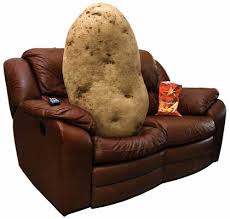周二聚會 6/4
時間: 每周二晚上7:00~9:30
地點: 怡客咖啡 Ikari Coffee
新北市板橋區文化路2段311號
板南線江子翠捷運站2號出口旁
各位會員朋友們:
2013年6月4日將討論兩主題---
周二 6/4 1.遊學打工熱潮 2.沙發馬鈴薯

 More young Taiwanese heading abroad for working holidays ( CAN)
More young Taiwanese heading abroad for working holidays ( CAN)
A growing number of young Taiwanese are heading abroad for working holidays, and many are choosing Australia as their number one destination. One of the biggest draws is the pay, which is often triple that of Taiwan's. Is this working holiday fever another sign of Taiwan's brain drain?
TAIPEI: Some 20,000 young Taiwanese have applied for a working holiday visa to Australia -- the number has jumped more than five-fold since 2006.
Many experts are worried that this could worsen a brain drain that Taiwan is already facing -- and there is good reason for concern.
Associate Professor Lee Chien Hung from the Chinese Culture University said: "Many jobs were lost after some industries moved abroad. And new jobs created from new industries were insufficient to close the gap quickly. So when supply of labour exceeded demand, this left little room for wages to grow."
Taiwan's wages have remained stagnant for more than 10 years. This has prompted some 30,000 Taiwanese to leave the island every year for better paying jobs overseas.
Assoc Prof Lee added: "When the high-level talents move overseas, the positions can't be easily filled by low-level staff. This would lead to an exodus of industrial professionals. The problem is likely to get worse over time."
Competition for jobs in Taiwan remains fierce.
At one job fair, more than 1,000 applicants were vying for 130 openings, with the starting salary being less than US$1,000 a month.
Many still choose to work in Taiwan because it is home, but that is not to say they are not feeling the pressure of high property prices and the rising cost of living. If their wages continue to lag behind other Asian neighbours, analysts warn that it is only a matter of time before Taiwan feels the full impact of a brain drain.
Questions:
1. Reasons why taking a working holiday is
a good idea?
Pros and cons of a working holiday?
2. About the minimum wage: “how much do you
want?”
3. Do you think the unemployment rate will
get worse?.
4. Would you like to work in a foreign
country?
Reasons why is good to work in a foreign country?
5. Want to move abroad?
沙發馬鈴薯

Being
a Couch Potato Is More Harmful Than You Think (www.fitday.com)
The idea of "couch potatoes"
tends to conjure up images of overweight, lazy unkempt slacker-types. We've
heard about the research that has shown that the more hours of television
watched per day, the higher the risk for overweight or obesity. The long-held
belief was that television junkies weighed more because they snacked more while
glued to the tube. But did you know that the actual position of lying down for
long periods of time is actually dangerous to your health?
How Being Lazy Affects Fat Cells
A new study out of Tel Aviv University,
published in The American Journal of Physiology - Cell Physiology, found that
preadipocyte cells, which are fat cell precursors, change into fat cells more
quickly and crank out even more fat when you lie down or sit down. These
extended periods of siting or resting horizontally where we put weight on parts
of our bodies are referred to as times of "mechanical stretching
loads."
In simple terms, being inactive causes your
body to create more fat within your already-existing fat cells, so the cells
themselves become larger. Constantly putting pressure on your body's cells
causes fat cells to spread out and grow bigger.
The Damage Is Irreversible
To prevent this irreparable damage to your
body, aim to cut back your tube time by several hours each week until you are
viewing no more than an hour per day. In addition to slashing your risk of
several health problems, you may find that you have more time for other
activities you love. Or, use the extra free time to explore new hobbies or
interests.
Questions:
1. Are you a couch potato?
Is it good to be a couch potato?
2. Is the internet making us couch
potatoes?
What are the facts that making us a couch potato?
3. How television/ internet has affected
our lives?
How many hours in a day you use internet or watch TV?
4. Do you eat a bedtime snack?
5. Do you exercise regularly?
What are your favorite ways to exercise?
6. Do you want to lose weight?


















0 意見:
張貼留言